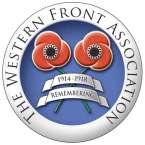1/5th Battalion, Gloucestershire Regiment

Henry James Fisher was born in Stroud on 23 March 1898 to Henry and Alice Fisher (née Tooze). Henry senior was born in Burton on Trent and Alice in Stroud. Henry senior’s father’s occupation was maltster so it is possible the family came to Stroud in approximately 1876 to follow this occupation.
Henry and Alice were married on Boxing Day 1889 and had daughter Lora Maud who was baptised on 20 June 1890. There was a third child at some time – Alice mentions having had one child in the 1911 census that had died.
Henry senior does not appear on a census with his family after 1891, although Alice describes herself as being married on both the 1901 and 1911 census. In 1901 she had two boarders living in her home. I have not been able to locate Henry elsewhere or confirmation of his death. The CWGC states that Henry James was the son of the late Henry and Alice Fisher of Slad Road, Stroud. Henry senior is stated as next of kin on Henry’s Military History Sheet which was completed sometime after 8 April 1918. Henry is shown on Lora’s wedding registration of 5 August 1918, so it would appear that he died between then and September when his son died.
Henry James Fisher enlisted at Gloucester on 12 September 1914 where his age was stated as 17 years and six months. He was previously employed in the office of the Stroud Brewery. He served at home until 20 August 1917 when he went to France where he served for 53 days.
Henry was wounded near Broodseinde on 5 October 1917 when a piece of shrapnel penetrated his steel helmet above his forehead, penetrating his brain. However, the shrapnel was removed by a doctor at the 64th Casualty Clearing Station at Mendinghem. One piece pierced his right eye and therefore damaged his sight.
There is a report in the Stroud News dated 8 February 1918 stating that Henry was in hospital at Bristol: ‘suffering from wounds to the head and the loss of the sight of an eye’. It appears he was there from 21 December 1917. The paper also reports that ‘he has written a very cheery letter to his friend, Mr S D Watson of Lansdown Stroud, and he hopes to be all right soon and back among us’.
Henry was discharged from the Army on 8 April 1918. He was entitled to wear one gold wound stripe and was awarded the British War Medal. His records state that he was: ‘Permanently excluded from liability to medical re-examination with the Military Service (Review of Exceptions Act 1917)’.
He had served for three years and 206 days and was deemed as ‘being no longer physically fit for war service’. At some time after he must have been moved to Eastleigh military hospital as there is a document from the records office in Warwick dated 13 February 1918, detailing personal items that were to be returned. These were a wallet, dictionary, letter, pens and nibs.
Henry clearly never recovered and he died in Stroud hospital on 28 September 1918, age 20. There is a funeral report in the Stroud News which reports that Henry was given a funeral with full military honours. His grave in Stroud Old Cemetery is now marked with a CWGC headstone.
As part of my research, I have looked in to the history of siblings. The S D Watson referred to in the newspaper’s ‘cheery’ report was actually George Dawson Watson. George was from Midlothian and had come to Stroud sometime before the 1911 census was completed to work at his uncle’s printing business and was living at 25 Lansdown, Stroud.
He married Henry’s sister, Lora, on 5 August 1918. Lora’s father Henry, is on the marriage certificate with his occupation given as ‘grocer’.
Research showed that both Lora and George died on the same day – 24 March 1962. The Stroud News of 30 March 1962 states that the home help found them both dead in bed at their home at 77 Stratford Road, Stroud. Both had died from natural causes, Lora having been ‘unwell for some time’. George had seen war service and had remained in the printing business from which he had retired. They were survived by their son, Paul Oliver Watson.
Researched by Helen Wollington November 2017
